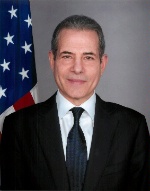
Welcome, Undersecretary Stengel
Last week, Rick Stengel was sworn into office, as the Under Secretary of State for Public Diplomacy and Public Affairs.
Stengel, who has previously served as a journalist and managing editor of TIME Magazine, will provide leadership of Department of State’s public diplomacy strategy and initiatives, overseeing the bureaus of Educational and Cultural Affairs, International Information Programs, and Public Affairs, as well as the Center for Strategic Counterterrorism Communications (CSCC).
Stengel recently sat down with CNN to discuss public diplomacy and his new role. He offered several interesting remarks, especially in light of Stengel’s previous experience as a journalist in Russia and recent events in there and in Ukraine.
Speaking on the restrictions against U.S. international broadcasting imposed in Russia, Stengel pointed out the disparity of broadcasting freedom between the U.S. and Russia:
“The very fact that they have to close our service in Russia and we allow their service here is evidence that we’re winning… in the battle of ideas—when we’re talking about freedom of expression, freedom of religion, freedom of movement—I think that demonstrates that on our side.”
On al Qaeda’s use of social media:
“Al Qaeda and its affiliates [are] very sophisticated about their own narrative, their own ideas, and their recruitment on social media. So we thought, we need to rebut that, and rebut, again, that counternarrative with the truth… We’re out there… contesting the space… it’s not simply just to say, ‘here’s our policy.’ We have to say ‘no, that’s completely wrong what you’re doing.’”
On the effectiveness of public diplomacy:
“…[W]e need to do a better job of explaining our policy, explaining where we stand, but we also have to realize… people may still disagree with our policy and what we want to do, and that happens all the time. I want to do a better job of explaining it; I think you can win some people over that way. But again, there of plenty of people who will just say, ‘well I don’t like that policy. It’s wrong.’” I think that’s fine. I just want people to see us as being open and transparent.”
Commenting on the results and benefits of U.S. involvement abroad:
“We are a model of anti-imperialism. If you look at even the engagement over the past couple of decades, what you have coming out of it is elections—you have people having freedom of choice to determine their own form of government.”
“…[T]he engagement of the US in the world is a powerful advantage for us—powerful economically. We spend on foreign aid and the State Department together only one percent of the federal budget. People think it’s ten, twenty times of that. It comes back to us in [multiple] ways. We have to be able to tell that story…”
On public diplomacy:
“Public diplomacy is really about soft power, the power of our ideas, of our actions, of our policy, and how to communicate that.”
“We are living in an age where public diplomacy is done at the speed of light, the speed of social media.”
On American ideals:
“I’m a devout believer in the power of the American brand, the power of the America ideas, the power of shared values between us and people around the world. I believe that we are standing for what’s going on in the future, [such as] freedom of expression, innovation, entrepreneurship, all of those things that are powerful about the American image and the American brand. I think there are many, many opportunities for collaboration, and America still is a beacon for so many people around the world.”
View the complete interview here and here, and follow Stengel on Twitter here.





